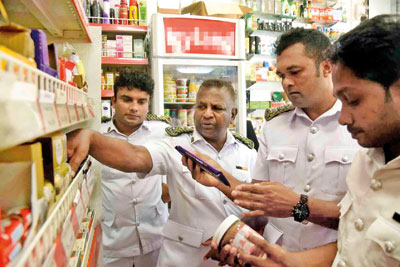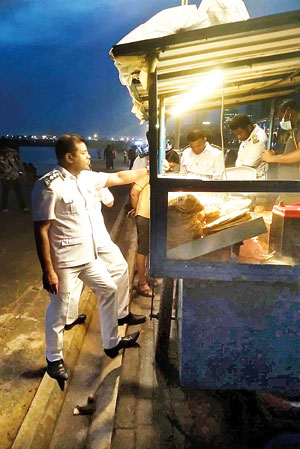News
Food items tainted with a cocktail of chemicals
View(s):By Kasun Warakapitiya
The food consumed by the general public contains a cocktail of chemicals including colouring, additives, mixtures of substances to enhance taste and textures to ensure sales, Public Health Inspectors investigations have revealed.
The most recent incident occurred on Thursday this week as the Weerawila police detected 28,750 kilos of rice which was to be transported to Tissamaharama.

PHIs carrying out checks in Colombo. Pix by Akila Jayawardena
The detection was made during a morning patrol on Hambantota-Wellawaya Road when they noticed a suspicious container. They learned that the container was transporting rice from Akkaraipattu to Tissamaharama.
Thereafter, when they checked inside the container they found discoloured rice and alerted the PHI of the area.
The police presented the facts to Tissamaharama Magistrate Courts on Friday. The courts ordered the PHIs to carry out further investigations and report.
The Sunday Times learned that the investigations have been carried out by the PHI in the area, while samples of rice found in the lorry are to be sent to the laboratory of the National Institute of Health Sciences.
Apart from that, the Akkaraipattu area PHI too, was asked to check the rice mill.
People complained that mills which store rice for many years, polish and add colouring. They said they only detect the colouring when they wash the grains before cooking.
PHIs island-wide had made many detections over six months. 
In another incident, they detected aflatoxins, produced by certain fungi found on agricultural crops in a sample of ingredients used to produce nutritional cereal. The company was charged with having aflatoxins in a nutritional cereal exceeding the allowed limit.
The company was ordered by the Walasmulla Magistrate to pay a fine of Rs 60,000 and rectify their fault within a month, after the company pleaded guilty.
In a separate incident, coconut oil stored in barrels used to transport engine oil was detected when PHIs checked a coconut oil production company in Galle.
The 1,500 kg coconut oil was seized and produced as evidence before the Galle Additional Magistrate Courts. The courts imposed a Rs 33,000 fine on the company after they pleaded guilty. The magistrate also ordered the oil to be given for soap production, under the supervision of PHIs.
In one incident, 370 kilograms of chillie powder were detected by PHIs in Ambalangoda. The suspects were brought to Balapitiya courts along with Government Analyst reports. Thereafter, the courts imposed a fine Rs 30,000 and the chillie was ordered to be destroyed.
These are some of the incidents reported recently, yet more cases are left undetected as Sri Lanka lacks laboratories to carry out investigations on food adulteration.
The president of the Association of South Asian Association for Regional Cooperation (SAARC) food in Sri Lanka, Dr Renuka Jayathissa told the Sunday Times that there are no laboratories capable of checking samples of food, therefore, the authorities are unable to take legal action with essential evidence and press charges.
“There is also a lack of equipment as well as chemicals to check what had been added to food items, within laboratories. This has given adulterers a chance to carry out their acts undetected and unchallenged.’’
She said that apart from adding harmful colouring and chemicals, there are instances of use of cooking oil discarded from hotels which have harmful trans-fat.
Dr Jayathissa explained that when food laced with harmful chemicals are consumed, people’s health fails. She said food allergies and food intolerance are common illnesses, yet prolonged consumption of adulterated food could also lead to diabetes, heart disease, and cancer.
She elaborated that the culture of providing poor quality food and earning profit have become a trend due to loopholes in the consumer affairs law, outdated fines in the archaic Food Act as well as lack of resistance by the general public.
“Though the Consumer Affairs Authority officials as well as public health inspectors are empowered to take action against food adulteration under the Consumer Affairs Act, and Food Act, their inaction, loopholes in the laws as well as fines that have not been updated, have given an assurance to food adulterers to continue their behaviour.”
PHIs said fines against food adulteration must be increased to end repeat occurrences.
Treasurer of the Public Health Inspectors Association, W. D Roshan Kumara said that although samples are collected from shops, they are unable to take actions themselves as they need to await Government Analyst reports.
“Also, according to the Food Act of 1980 we can fine Rs 10,000 if someone sells adulterated food which could be harmful,’’ he said.
“Most colouring added to spices is permitted food colouring, but according to the Food Act, adding colouring to spices is banned. We cannot charge the culprit with selling food with substances injurious to health, therefore, they are fined for dropping quality standards and are only fined Rs 3,000.’’
Mr Kumara who is also administrative PHI covering Karandeniya area, explained that fines in the Food Act are archaic and need to be increased.
The Consumer Affairs Authority pointed out that even though they can take action against merchants for deceiving consumers, direct legal action against food adulteration is under the preview of PHIs.
Director Consumer Affairs and Information, Asela Bandara said that PHIs are directly authorised under the Food Act to take action against food adulteration.
However, the CAA would carry out inquiries and take legal action if they detect food adulteration and incidents of deceiving of consumers.
He said that apart from that, the CAA is currently carrying out action against merchants who fail to display prices of food and items.
Meanwhile, the National Movement for Consumer Right’s Protection (NMCRP) said that both the Health Ministry and the CAA share the responsibility for taking action on food adulteration.
The president of the movement, Ranjith Vithanage said the CAA is empowered to act against persons who deceive consumers according to the Act.
“CAA can’t say it has no direct authority. It can take action according to the Act but they are not active. It can take action for false labelling and selling expired items,” he said.
| Consumers told to avoid ‘artificial’ productsSri Lankans are forced to take trial and error methods to identify adulterated goods as they are unable to identify the quality of the food on shelves Dr Renuka Jayathissa said. She advised the consumers to never purchase food items from shops and boycott brands which provide sub standard food or adulterated food. Public health inspectors also called on people to reduce buying artificial food products. They called on the public to always use reputed branded items as the companies which produce food items would try to maintain brand names and try to minimise the amount of adulteration. They also advise consumers to read the labels of packaged food and choose items with the least amount of preservatives and chemicals published on wrappers.
| |
| Governor intervenes to initiate food raidsBy L.B.SenaratneWhile a consumer affairs division at the Kandy District Secretariat and a consumer protection unit at the Kandy Municipal Council exist to conduct raids and check on consumer items with regard to their expiry dates, it fell on Central Province Governor Lalith U. Gamage to order such raids following a stream of public complaints. The governor ordered the Kandy Municipal Commissioner to conduct raids on food stores after complaints that the council was not acting on public complaints about traders selling outdated items. The raids yielded results, with officials detecting outdated chocolates and other sweet items being sold at several shops. Legal action is to be taken against the errant traders. People who made the complaints say it is indeed a sad state of affairs that the governor had to intervene for consumer protection officials in the municipality and the Secretariat to act. |
The best way to say that you found the home of your dreams is by finding it on Hitad.lk. We have listings for apartments for sale or rent in Sri Lanka, no matter what locale you're looking for! Whether you live in Colombo, Galle, Kandy, Matara, Jaffna and more - we've got them all!

